|
|
|
Sort Order |
|
|
|
Items / Page
|
|
|
|
|
|
|
| Srl | Item |
| 1 |
ID:
076516
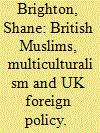

|
|
|
|
|
| Publication |
2007.
|
| Summary/Abstract |
After the 7 July and 21 July 2005 attacks on London the government-sponsored effort to `prevent extremism together' has repeatedly acknowledged the central role of anger at UK foreign policy in the radicalization of some British Muslims. This acknowledgement has been incorporated into a `comprehensive framework for action' centring upon the need for increased `integration' and an effort, critically, to re-work British multiculturalism as a means to combat terrorism. Examining the history of multiculturalism in Britain and the tradition of living and acting `together' that it suggests, however, raises a set of questions about the society into which integration is supposed to occur, what integration might involve and its real efficacy for combating terrorists. In addressing these issues, this article suggests that the debate over contemporary multiculturalism should be situated within a much wider social and political crisis over the meaning of `community' in the UK, to which questions of global order and foreign policy are central. Comparing the `ethical' basis of Al-Qaeda's attacks with Tony Blair's invocation of `values' as the foundation for military intervention reveals that both seek to realize models of community through violence and a shared process of `radicalization' which in both cases precedes 9/11 and which might be traced back to the Gulf War of 1991. The article concludes that debate over the future of multiculturalism in the UK is being conducted alongside and is implicated within a second, violent global conflict over community: one which is central to, but essentially unarticulated within the domestic context.
|
|
|
|
|
|
|
|
|
|
|
|
|
|
|
|
| 2 |
ID:
076519


|
|
|
|
|
| Publication |
2007.
|
| Summary/Abstract |
The ceasefire agreement signed in 2002 between the LTTE/Tamil Tigers and the government of Sri Lanka (GoSL) now lies in complete disarray. The civil war has restarted; at least 3,500 lives have been lost in 2006 as a result and `disappearances' are also increasing. This is a particularly difficult time for the civilian population trapped between the two sides. It is not clear whether or not either side has taken clear-cut strategic decisions or know what they hope to achieve during this unfortunate chapter in the civil war. Does the LTTE regard this phase as a prelude to somethingbigger, seeking to demoralize and weaken the GoSL security forces prior to a major offensive? Or is this a frustrated reaction to a failed peace process and a major split in the LTTE ranks? What aims are the GoSL seeking to achieve by paying so little attention to the impact of their assaultson innocent civilians in the north and east? Moreover, where does the international community turnnext? If there is to be a signi. cant victory by either side, the major obstacle and challenge in the future will be legitimacy on the one hand and governance on the other.
|
|
|
|
|
|
|
|
|
|
|
|
|
|
|
|
| 3 |
ID:
076521


|
|
|
|
|
| Publication |
2007.
|
| Summary/Abstract |
In a world where most of the great cities are heavily branding themselves to compete for lucrativebusiness, political and sporting events, what future role is there for an international values-based city like Geneva? This article reflects on the history of ideas that have taken root in Geneva over the centuries and suggests how they might be actively re-positioned to give the city continuing relevance in the coming century. It looks at eleven political and practical ideas that have hadimportant manifestations in Geneva and have been embodied in some of its international organizations, notably: freedom of movement; free thinking; political self-determination; compassionate warfare; peace and trade among others. It then argues that, in order to survive as a leading international city, Geneva must develop real expertise on these big-hitting political issues, improve its ability to deliver on them and create a dynamic alliance of other internationalist valuesbased cities around the world which can mobilize similar concerns and embody a similarly Genevan model of international space.
|
|
|
|
|
|
|
|
|
|
|
|
|
|
|
|
| 4 |
ID:
076518
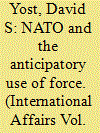

|
|
|
|
|
| Publication |
2007.
|
| Summary/Abstract |
Only since the end of the Cold War, and particularly since September 2001, have questions of anticipatory action arisen in alliance deliberations concerning the use of force. In initiating their Balkan operations, it should be recalled, the allies did not face direct threats, but intervened toterminate conflicts and human rights abuses and to shape their security environment. It has been difficult for the alliance to get to grips with the new security challenges presented by terrorism and the proliferation of weapons of mass destruction because of its history, its intrinsic character, and the nature of the new security challenges. Its history includes a strictly reactive posture during the Cold War and its interventions from a position of overwhelming superiority in the Balkan conflicts. The new security challenges place under stress the alliance's intrinsic character as a permanent coalition of sovereign independent states committed to collective defence because these challenges may endanger specific allies to differing degrees (in contrast with the overarching Soviet threat during the Cold War) and revealdiff erences in interests, capabilities and strategic cultures among the allies. The allies have not yet resolved questions concerning the legality and legitimacy of the antici patory use of force, nor have they fully explored the implications of concepts such as `constructive abstention' and `NATO in support' with regard to preemptive or preventive operations undertaken by a group of allies.
|
|
|
|
|
|
|
|
|
|
|
|
|
|
|
|
| 5 |
ID:
076522
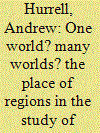

|
|
|
|
|
| Publication |
2007.
|
| Summary/Abstract |
This article is a revised version of the 2006 Martin Wight Memorial Lecture and examines the placeof regional states-systems or regional international societies within understandings of contemporary international society as whole. It addresses the relationship between the one world and the many worlds-on one side, the one world of globalizing capitalism, of global security dynamics, of a global political system that, for many, revolves a single hegemonic power, of global institutions and global governance, and of the drive to develop and embed a global cosmopolitan ethic; and, on the other side, the extent to which regions and the regional level of practice and of analysis havebecome more firmly established as important elements of the architecture of world politics; and the extent to which a multiregional system of international relations may be emerging. The first section considers explanations of the place of regionalism in contemporary international society and the various ways in which the one world aff ects the many. The second section deals with how regionalism might best be studied. The final section analyses four ways in which regionalism may contribute to international order and global governance
|
|
|
|
|
|
|
|
|
|
|
|
|
|
|
|
| 6 |
ID:
076517
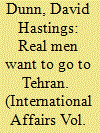

|
|
|
|
|
| Publication |
2007.
|
| Summary/Abstract |
The desire for regime change in Iran has coloured the Bush administration's approach to the challenge presented by Tehran's apparent desire to build a nuclear weapons capability. Yet the threat of military force either to destroy Iran's nuclear infrastructure and/or to eff ect regime change has proved counterproductive to the simultaneous eff orts to stop the Iranian programme through diplomacy. Indeed, the entire Bush policy towards Iran of simultaneously wishing to coerce, undermine and replace the regime while also seeking to persuade it to abandon its nuclear programme through diplomacy has proved both strategically inconsistent and consistently counterproductive. In failing to decide whether it prioritizes a change of regime or a change of behaviour it has got neither. This article elucidates the rationale behind the Bush administration's policy approach, demonstrating how in seeking both objectives simultaneously it has achieved neither. It sets out instead a set of policies to regain the initiative in US-Iranian relations and to prioritize and coordinate American policy goals within a broader Middle East policy.
|
|
|
|
|
|
|
|
|
|
|
|
|
|
|
|
| 7 |
ID:
076520
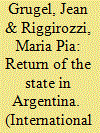

|
|
|
|
|
| Publication |
2007.
|
| Summary/Abstract |
Argentina's economic collapse in December 2001 is seen as perhaps the most emblematic evidence of the failure of neoliberalism to provide sustainable and equitable economic growth in the developing world. A new policy frame has gradually emerged in Argentina which relies on a more active statein the promotion of growth. This article examines what state-led growth can mean in the context ofopen markets. It explores in detail the policies implemented since 2002 and asks to what extent they constitute a possible route to stable post-crisis governance.
|
|
|
|
|
|
|
|
|
|
|
|
|
|
|
|
|
|
|
|
|